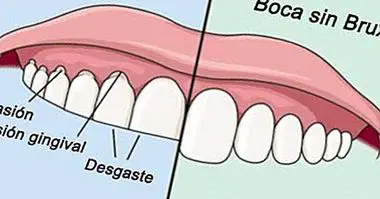Memory loss due to stress: causes and symptoms
Whether it occurs transiently or sustained, the physiological stress response alters memory, causing difficulties in retaining new information and recovering memories that have already been consolidated.
However, the effects of stress on memory can be somewhat contradictory and they differ according to whether we talk about acute or chronic stress.
Relationship between stress and memory loss
When the demands of the situation in which we find ourselves exceed our physical and / or cognitive capacities, our body activates the stress response. This consists of the release of glucocorticoids, the stress hormones, in the bloodstream.
Glucocorticoids cause different effects in the organism, among which are the increase in heart rate and respiratory rate, the reduction of gastrointestinal activity and the release of stored glucose reserves to use them as an energy source.
If its concentration is excessive glucocorticoids, among which cortisol stands out, can have a negative effect on the functions of the hippocampus, brain structure that is associated with the formation and recovery of memories. This is partly because glucocorticoids redirect glucose from the hippocampus to nearby muscles.
Two types of stress have been described according to their origin: the extrinsic and the intrinsic . Extrinsic stress is caused by non-cognitive factors, such as those that come from a given situation, while the intrinsic stress is related to the level of intellectual challenge that a task requires. Some people have chronic intrinsic stress.
Stress interferes both with our ability to retain new information and to recover memories and knowledge, causing memory loss. In addition, extrinsic stress seems to affect spatial learning. In the following sections we will describe these effects in more detail.
Law of Yerkes-Dodson: the inverted U
The law of Yerkes-Dodson affirms that stress does not always interfere negatively in cognition , but a moderate degree of brain activation improves memory and performance in intellectual tasks. In contrast, the excessive increase in stress levels worsens cognitive functions.
This results in the so-called "inverted U effect": if our organism responds to environmental demands with mild or moderate stress responses, the efficiency of our productivity increases until it reaches a threshold (the ideal point of activation) from from which the performance decreases progressively and memory losses occur.
Stress responses too intense interfere with the performance of intellectual tasks because they are associated with physical and cognitive symptoms such as concentration difficulties, tachycardia, sweating, dizziness or hyperventilation.
Effects of acute or transient stress
When we are in a stress situation, our attention is focused on the most salient stimuli, while we focus less on the rest; This phenomenon is known as "tunnel vision" and facilitates the consolidation of some memories while interfering with others, causing memory loss.
Acute stress can have beneficial effects on some types of memory but only under certain conditions. In this sense it is worth mentioning the law of Yerkes-Dodson; on the other hand, some studies have shown that glucocorticoids improve the formation of new memories but worsen the recovery of others already existing.
In addition, emotionally relevant stimuli are better remembered if the stress response has occurred previously, if information retrieval takes place shortly after coding and if the recall situation is similar to that of learning.
Other research suggests that under stress conditions, we learn and remember more information and situations that cause emotional distress. This fact is associated with the mood congruence effect described by Gordon H. Bower, which describes similar results in relation to depression.
Consequences of chronic stress
The stress response not only involves changes in memory at the time it occurs, but if it is maintained chronically it can cause long-term damage to the brain. Since the organism consumes many resources and reserves in the activation of these physiological processes, Chronic stress is noticeably more harmful than acute stress .
After situations of acute or transitory stress our body recovers homeostasis, that is, the physiological balance; On the other hand, chronic stress prevents the organism from reaching homeostasis again. Therefore, if stress remains unbalanced the body's responses.
From a physiological point of view, this facilitates the appearance of symptoms such as abdominal, back and head pains, chronic difficulties to concentrate and to conciliate or maintain sleep, crisis of anguish, etc. In addition, continued stress is associated with social isolation, depression and the development of cardiovascular diseases.
Regarding memory loss, chronic stress increases the risk of suffering from dementia in elderly people. These effects are probably related to the activity of glucocorticoids in the hippocampus and in other regions of the brain on which memory and cognition in general depend.



















